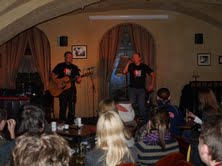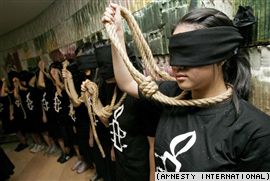Representatives of the Human Rights Defenders against the Death Penalty campaign were busy educating the general public in many cities across the country by giving out leaflets, stickers and brochures on the problem of existing in Belarus capital punishment. They also asked to sign an on-line petition.
HR defenders always believed that education was an important milestone on the way to the abolition. The decision on the highest level largely depends upon the public opinion.
Death penalty? Still? According to HR defenders, many ordinary people were surprised that Belarus still exercises this type of punishment, which has been abolished everywhere in Europe and even in other post-Soviet countries. A large number of passers-by showed an interest in the events, staged by HR defenders. People asked questions, took leaflets, reading them on their way.
According to HR defenders, many ordinary people were surprised that Belarus still exercises this type of punishment, which has been abolished everywhere in Europe and even in other post-Soviet countries. A large number of passers-by showed an interest in the events, staged by HR defenders. People asked questions, took leaflets, reading them on their way.
On 10 October in Minsk, close to the main square, HR and youth activists organised a live information chain. Activists were trying to engage Minsk dwellers by telling them about families of executed, who suffered from not even knowing where their relatives were buried. The participants to the event were wearing easily recognisable t-shirts that read ‘Say NO to the death penalty.’ HR defenders noted that many people were appalled by the fact that ‘the country in the heart of Europe’ was still killing its citizens. However, state officials still believe that the society is not ‘ready for any changes on [the death penalty] question.”
Culture presses 
Culture, which is often considered to be outside of politics, was actively engaged in the question of the death penalty in Belarus. It is praiseworthy that Sting while on the tour in Minsk made a youtube video calling to stop capital punishment practices.
“Hello! My name is Sting and I am against the death penalty in all cases because I believe in human dignity. In Europe just one country carries out the death penalty and that country is Belarus. It’s time to change. Make your voice heard. Sign the petition against the death penalty in Belarus. And let’s put a stop to this cruelty for good,” the artist wearing the ‘Say No to the Death Penalty’ t-shirt said.
 Following the famous singer musicians from Belarus and Lithuania played a charity concert in Vilnius calling upon people to say NO to the death penalty in Belarus. Andrius Zaleska, a lead-singer of the Lithuania band, said that he performed for free because “good ideas should always be supported whichever way one was able to.”
Following the famous singer musicians from Belarus and Lithuania played a charity concert in Vilnius calling upon people to say NO to the death penalty in Belarus. Andrius Zaleska, a lead-singer of the Lithuania band, said that he performed for free because “good ideas should always be supported whichever way one was able to.”
In Vilnius activists from the NGO called Belarus Watch and Belarusian Human Rights House joined in with the campaign.
Andrei Paluda of Human Rights Centre Viasna/Spring believed that it was very natural to ask cultural icons for support as there is a need to press the authorities. Paluda expressed his hope that when he next time gives an interview “the death penalty would be no more in Belarus.”
 “Death is no justice”
“Death is no justice”
Besides Belarusian HR defenders who are actively pursuing the death penalty abolition, international organisations also started their informational campaign in the country. On 8 October in Minsk the exhibition titled ‘Death is not justice’ opened at the WW2 museum. 100 posters advocating the death penalty abolition, selected in a competition sponsored by the Council of Europe Secretary General Thorbjørn Jagland, were shown to the public. The exhibition will stay entrance free in Minsk until 11 December.
Several dignitaries attended the opening including the acting head of the EU delegation in Belarus Jean-Eric Holzapfel, the Hungarian ambassador Ferenc Kontra, the representative from the Council of Europe Directorate of Democracy and Political Affairs Daniil Khochabo.
This level of attention from European political bodies demonstrates that the death penalty question in Belarus is highly politicised. For many years this issue has been ‘traded’ between Belarus and EU. The persistence with which Belarus continues to hold on to the death penalty hampers its status in the Council of Europe.
Belarusians sentenced to death and awaiting execution cannot appeal to the European HR Court. It appears that the authoritarian country with a far from transparent justice system does not want yet another mechanism of external control. On the other hand, the death penalty in Belarus could be abolished in a day – with a presidential decree. Presumably, it could be the first concession of Belarus to Europe if the need arises as the death penalty abolition does not threaten the current regime.
***
Every year in Belarus several people are condemned to capital punishment and executed. Andrei Zhuk and Vasil Yuzepchuk were the last ones. They were killed this March. Their relatives were not informed when and where the execution took place. Families got to know about the departed only when they went to prison for a visit. Bodies were not given to families to a proper burial ceremony. There were no graves. Now other prisoners are currently on death row, awaiting their legalised murder.





